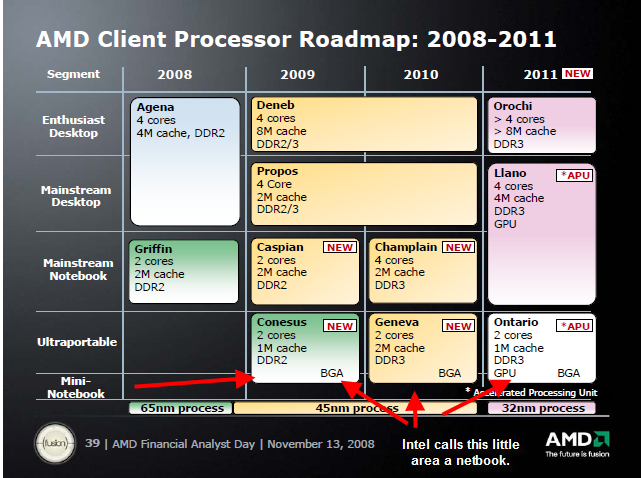Netbooks, mini-notebooks, ultraportables and semantic fun with AMD

AMD is targeting what Intel calls the netbook market, but not completely. Here's a tale of semantic fun on Friday night.
When I read Brooke Crothers report on how AMD wasn't entering the netbook market I was shocked. After all, I was one of those people that interpreted AMD's musings Thursday as an indicator that it was going to take on Intel in at least part (the high end) of a category the chip giant basically created--netbooks. And if I was so off-base I figured I would have heard from AMD right away. I thought I captured most of the nuances AMD was tossing out to analysts. In most cases when I'm wrong I hear from a vendor within minutes, may be a half an hour max. So what's going on here? A lot of definition disagreement with a dose of marketing spin.
First, let's cue the definitions. Here's how AMD's Pat Moorhead, vice president of advanced marketing, is defining things:
Netbooks & Mininotebooks (these terms are interchangeable, IDC and Gartner prefers to use the term mininotebook): Generally weigh less than 3 pounds, are 10” or less with a small keyboard, are capable of browsing the Internet, sending and receiving email, viewing online photos and videos. They are not ideal for multitasking, multimedia (recording TV; creating, viewing or editing HD video; Photoshop), downloading music, streaming music and video and playing games. They are usually priced below $500. FYI: netbook is an Intel marketing term, visit www.netbook.com to see.
Ultraportables: Still sleek and stylish, but in the 3- 5 pound range and are generally 11 – 13” screens. They provide a fuller PC experience (so are capable of running Windows Vista and Windows XP), are capable of rich multimedia (including watching HD Web video) and are capable of gaming (obviously those with discrete graphics even more so). A current example of an ultraportable on the market is the MacBook Air or the Fujitsu Lifebook P8020.
To be clear, Yukon is targeting ultraportables and not netbooks/mininotebooks.
But clearly, AMD isn't going to complain if it gets a few netbook/mininotebook designs. From AMD spokesman John Taylor:
The notebook PC market is increasingly varied in form factor. Most industry analyst firms are working to create better definition of categories. Simply stated, we are primarily targeting ultra portable notebooks with Yukon. Emphasis on 10-12 inch screens, full PC functionality and thinness. We think some mini notebook design wins may occur, though. Netbooks or mini notebooks are smaller screens and targeted at full web capability.
The difference between a netbook/mininotebook and an ultraportable is an inch and the lines between the two will blur further in coming months. Intel seems to define a netbook as anything that's clamshell and cheap. Simply put, AMD is looking to skim the high end of Intel's netbook market. That's why you get charts like this from AMD (click to enlarge):
And.
Citi analyst Glen Yeung writes:
Key upcoming platforms for AMD include the Yukon platform for ultraportable and high-end netbook PCs in 1H09. AMD is not targeting the majority of the netbook category of notebooks, since its products don’t have the cost structure to profitably address the market. AMD will launch a 1 core version of its ultraportable notebook processor called Huron to address the high-end of the netbook market which it believes will be targeted at users looking for a richer computing experience.
Add it up and I conclude the following:
- AMD is "ignoring" the netbook market, but not really. It wants to create an alternative that competes with what Intel has laid out. AMD is hoping to make netbooks a PC market slum.
- AMD isn't going to use the term "netbook" because it is deemed an Intel "marketing term." Memo to AMD: If you create a new category you get dibs on cooking up the cool names.
- AMD is trying to redefine the category and messaging so it can better compete. And that's smart business. If AMD can portray mini-notebooks and netbooks as weak devices with too many compromises it will find itself in a sweet spot of the market.
If you're interested in this mumbo jumbo and don't believe anyone about this netbook, err mini-notebook, fiasco I encourage you to check out AMD's analyst meeting replay. That said, I can think of better things to do on a Friday night.
